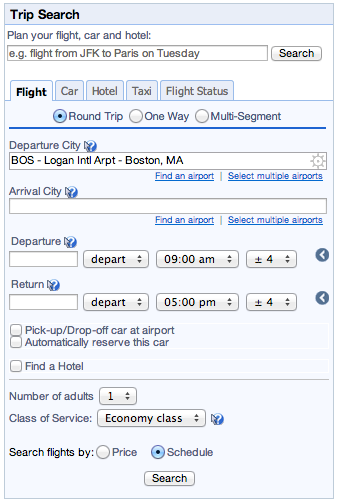My company uses Concur for travel management, and I am quite happy with their tools. One feature struck my immediate interest, which is their use of natural language processing/understanding (NLU/NLP). Ever since Apple introduced Siri to the mass market, speech assistants have gained public interest. Microsoft came out with Cortana recently. Google has Google Now, even though I wouldn’t necessarily qualify that as an assistant with its typical characteristics (dialog-based, traits of a character, etc.) at this point. However, Siri does not have a text-based interface, and I do occasionally miss that feature.
While I can do a quick restaurant or movie ticket reservation by saying “two tickets for Transformers at AMC tonight”, which fills the fields of the virtual “form” automatically for me (movie title, number of tickets, location, time), I cannot type the same. Would I want to? Heck yes! Natural language is such a natural interface for us humans, much more natural than filling in forms with isolated pieces of information. And well, sometimes I just can’t speak, unless I want to draw everyone’s attention to me in that boring meeting I’m attending…
Concur gives me the following dreaded form that all of us have seen, of which a number of fields are typically irrelevant for me:
What you might have overseen is the text field at the top. That one is a natural language inquiry field. Check this out:
With one simple sentence I gave it all the data it needs to know for my booking, and it is smart enough to assign the values to the respective fields for me. One further click on a button and I can review my flight options. Quite honestly, I experience this as a much more convenient UX than the good old form filling approach.
If you’re a user of Concur, do give it a try! It works just as fine with hotel or car reservations. Natural language understanding, speech OR text-based, is the next big UI, and it’s time to start exploring its use cases. (By the way, it’s great to see businesses deploy consumer-style technology. Not too long ago, this used to happen the other way around, when innovation came from the business world and got introduced to consumers later…)


